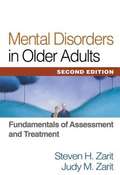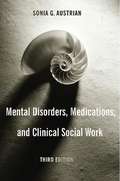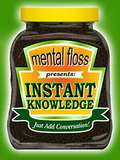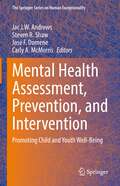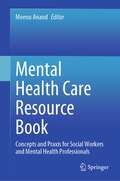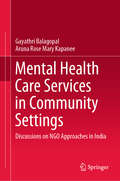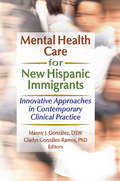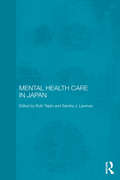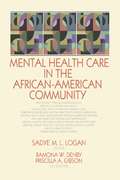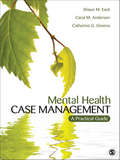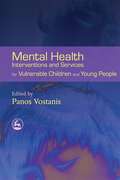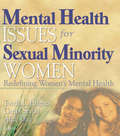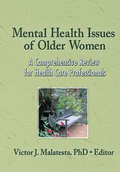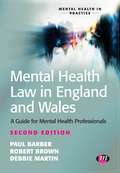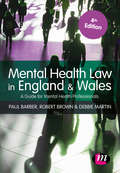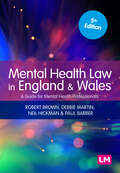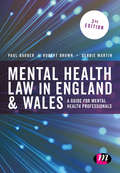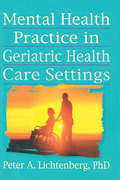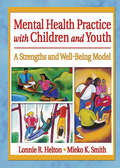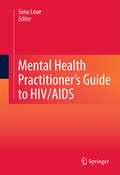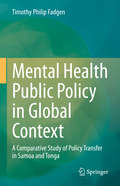- Table View
- List View
Mental Disorder: Anthropological Insights
by Nichola KhanThis brief book introduces the ways in which contemporary anthropology engages with the "psych" disciplines: psychology, psychiatry, and medicine. Khan also widens the conversation by including the perspectives of epidemiologists, addiction and legal experts, journalists, filmmakers, activists, patients, and sufferers. New approaches to mental illness are situated in the context of historical, political, psychoanalytic, and postcolonial frameworks, allowing readers to understand how health, illness, normality, and abnormality are constructed and produced. Using case studies from a variety of regions, Khan explores what anthropologically informed psychology, psychiatry, and medicine can tell us about mental illness across cultures.
Mental Disorders in Older Adults, Second Edition
by Steven Zarit Judy ZaritIllustrated with abundant clinical material, this book provides essential knowledge and skills for effective mental health practice with older adults. It demonstrates how to evaluate and treat frequently encountered clinical problems in this population, including dementias, mood and anxiety disorders, and paranoid symptoms. Strategies are presented for implementing psychosocial interventions and integrating them with medications. The book also describes insightful approaches for supporting family caregivers and addresses the nuts and bolts of consulting in institutional settings. Combining their expertise as a researcher and an experienced clinician, the authors offer a unique perspective on the challenges facing older adults and how to help them lead more fulfilling and independent lives. Three reproducible forms can also be downloaded and printed in a convenient 8 1/2" x 11" size.
Mental Disorders, Medications, and Clinical Social Work
by Sonia AustrianWritten for social workers by a social worker, Mental Disorders, Medications, and Clinical Social Work discusses the etiology, epidemiology, assessment, and intervention planning for common mental disorders. Looking at disorders from an ecosystems perspective, Austrian goes beyond a linear classification approach and DSM-IV-TR categories and encourages social workers to analyze the internal and external environmental factors that contribute to a disorder's development. Austrian's discussion of effective intervention(s) for a particular client also stresses the importance of working with families in treating disorders.In addition to information on new medications, biochemical data on the causes of disease, and diagnostic tests, the revised third edition discusses therapies such as motivational interviewing, cognitive-behavioral, interpersonal, and dialectic.
Mental Floss Presents Instant Knowledge
by Julie Sussman Will PearsonMental_floss is proud to present a full-bodied jolt of inspiration for thirsty minds on the go. Blended with titillating facts, startling revelations, and head-scratching theories collected from around the world, Instant Knowledge will jumpstart riveting exchanges at cocktail parties, the watercooler, or any powwow. Building upon the success of the mental_floss magazine, CNN news segment, board game, and mentalfloss.com website, comes a book filled with interesting facts and theories.
Mental Health (Critical and Radical Debates in Social Work)
by Jeremy WeinsteinMental health social work is at an impasse. On the one hand, the emphasis in recent policy documents on the social roots of much mental distress ,and in the recovery approaches popular with service users seems to indicate an important role for a holistic social work practice. On the other hand, social workers have often been excluded from these initiatives and the dominant approach within mental health continues to be a medical one, albeit supplemented by short-term psychological interventions. In this short form book, part of the Critical and Radical Debates in Social Work series, Jeremy Weinstein draws on case studies and his own experience as a mental health social worker, to develop a model of practice that draws on notions of alienation, anti-discriminatory practice and the need for both workers and service users to find ‘room to breathe’ in an environment shaped by managerialism and marketisation.
Mental Health Assessment, Prevention, and Intervention: Promoting Child and Youth Well-Being (The Springer Series on Human Exceptionality)
by José F. Domene Steven R. Shaw Jac J. W. Andrews Carly A. McMorrisThis book presents and integrates innovative ways in which the disciplines of school, clinical, and counseling psychology conceptualize and approach mental health assessment, prevention, and intervention for promoting child and youth well-being. It describes a synthesized model of clinical reasoning across school, clinical, and counseling psychology that demonstrates how decisions are made with respect to assessment, prevention, and intervention across situational contexts to ensure successful outcomes for children and youth. In addition, the volume examines theoretical,empirical, and practical frameworks and methods with respect to addressing the mental health and well-being needs of children and adolescents within and across school, clinical, and counseling psychology disciplines. In addition, the book presents transformative, constructivist, multicultural, innovative, and evidenced-based approaches for working with children and youth as well as their families relative to the identification of mental health concerns, enhanced service system integration, social justice and advocacy.This book is an essential resource for researchers, clinicians, therapists, practitioners, and graduate students in clinical , counselling,and school psychology, social work, educational psychology, child and adolescent psychiatry, developmental psychology, pediatrics and all interrelated disciplines.
Mental Health Care Resource Book: Concepts and Praxis for Social Workers and Mental Health Professionals
by Meenu AnandThis book takes a strengths-based approach to focus on different aspects of mental health. It summarizes the complex intertwining of illness and culture in the context of rising cases of mental disorders in the post-pandemic world. The book contains three sections, each incorporating essential skills and praxis. The book's first section examines the fundamental and conceptual underpinnings of mental health, well-being, and wellness from an eclectic lens to present an overview of mental health from the biopsychosocial perspective. The second section demonstrates using and transforming theoretical principles and perspectives into practice-based skills through detailed narrations and illustrations. It also showcases how to apply these skills in real-world settings. The third and final section combines field-based narratives that reflect multifaceted challenges and efforts toward treating mental disorders and promoting positive mental health, including success stories in diverse settings.This section highlights the importance of praxis in mental health. The book is a valuable resource for scholars and professionals in various fields, such as social work, psychology, sociology, social psychiatry, gender studies, and anyone interested in learning more about mental health and well-being.
Mental Health Care Services in Community Settings: Discussions on NGO Approaches in India
by Gayathri Balagopal Aruna Rose KapaneeThis book discusses approaches used by NGOs in formulating and implementing mental health care in the community in the context of high treatment gap, insufficient public expenditure on health, human resource shortages, heterogeneity of communities as well as cultural beliefs in India. It uses a qualitative case study approach to document and analyse the work of some major NGO-run community mental health programmes in India, all of which cater to vulnerable populations and are in different and diverse regional settings. It casts the spotlight on envisioning community mental health in policy and law, implementation by the government, how it is practised by select NGOs and the challenges involved in programme implementation. In doing so, it hopes to understand the trigger factors that have led to NGOs embarking on community mental health programmes: how needs of the community are understood, the funding mechanisms, how the human resource gap was addressed, type of networks formed in the community, therapeutic and social interventions, accountability mechanisms, achievements and limitations of the programmes. This book is for students and researchers in the fields of social work and psychology, and NGOs, government and funding agencies, and for those interested in understanding and working with community mental health programmes.
Mental Health Care for New Hispanic Immigrants: Innovative Approaches in Contemporary Clinical Practice
by Marcia Finlayson Manny J Gonzalez Gladys M Gonzalez-RamosSave time-inform your clinical planning with core knowledge and tips offered from experienced clinicians!While many Hispanic groups have lived in the mainland United States for years, there now is a growth of new groups, such as Dominicans in New York City and Cuban refugees that are in need of culturally competent mental health care. Mental Health Care for New Hispanic Immigrants: Innovative Approaches in Contemporary Clinical Practice will help mental health clinicians gain insight into essential clinical issues facing those who work with these new immigrants. This text, designed to aid in direct clinical practice, will guide you in the effective delivery of comprehensive psychosocial services. It arms you with the latest demographic information and offers valuable suggestions for treatment in different modalities for under-served Hispanic groups.Mental Health Care for New Hispanic Immigrants: Innovative Approaches in Contemporary Clinical Practice presents insights and practice approaches from respected authorities and explores latest trends on these new populations. You&’ll find an in-depth examination of the mental health disparities in Hispanic immigrants, a conceptual overview of reasons for immigration and migration patterns, and a look at the unique stressors new groups face which impact immigrants&’ mental health. Detailed data on each group, important highlights of pertinent historical aspects, and in-depth discussions of helpful assessment, treatment, and practice issues provide effective approaches illustrated through discussion and case studies.In Mental Health Care for New Hispanic Immigrants: Innovative Approaches in Contemporary Clinical Practice, you will find: detailed research and clinical information about new immigrant groups explorations of the growth of new groups, such as Dominicans in New York City and Cuban refugees recently reaching the shores of Florida information on psychosocial stressors, psychiatric diagnoses, and utilization of services among undocumented immigrants effective outreach techniques a detailed list of resources including extensive Web sites, national centers for the study of Hispanic groups, and important published works used for research and practice up-to-date demographics on new groupsMental Health Care for New Hispanic Immigrants: Innovative Approaches in Contemporary Clinical Practice brings vital information geared to the direct practice professional in psychology, social work, psychiatric nursing, and psychiatry, as well as graduate-level students in these fields.
Mental Health Care in Japan (Routledge Contemporary Japan Series)
by Ruth Taplin Sandra J. LawmanMental health, including widespread depression, a high suicide rate and institutionalisation, is a major problem in Japan. At the same time, the mental health care system in Japan has historically been more restrictive than elsewhere in the world. This book looks at the challenges of mental health care in Japan, including problems such as the institutionalisation of long-term patients in mental hospitals. The book discusses the latest legislation to deal with mental health care, and explores the various ideas and practices concerning rehabilitation into the workforce, the community and service user groups that empower the mentally ill. It goes on to look at the social stigma attached to the mentally ill in Japan and Britain, which touches upon the issue of counselling those with post traumatic stress after the recent earthquake.
Mental Health Care in the African-American Community (Haworth Social Work In Health Care Ser.)
by Sadye M. L. Logan Ramona W. Denby Priscilla A. GibsonOver the course of an African American’s lifetime, mental health care needs change according to an individual’s unique interactions with his or her environment. Mental Health Care in the African-American Community uses this perspective to provide a deeper analysis of factors and issues affecting the mental health of African Americans. This comprehensive text provides a current and historical analysis of the impact of mental health research, policy, community, and clinical practice from a life course perspective. Stressing evidence-based practice as an expanded way to think and talk about individualizing and translating evidence into a given practice situation, this valuable book provides a social work context for all helping professions. Mental Health Care in the African-American Community provides the helping community with non-traditional, expanded ways of thinking and intervening in the mental health needs and care of African Americans. Organized logically, this complex subject presents data in a user-friendly way that engages the reader, and provides chapter summaries and suggested group/classroom activities to facilitate understanding. This text is extensively referenced and includes figures and tables to clearly illustrate data. Topics in Mental Health Care in the African-American Community include: a historical overview of African Americans’ mental health care a conceptual and theoretical framework for African Americans’ mental health current issues affecting mental health intervention for African Americans mental health in group homes and foster care depression substance abuse poverty ADHD suicide mental health in elderly African Americans mental health policy rural African American mental health needs kinship care multiethnic families and children much, much more! Mental Health Care in the African-American Community is a valuable textbook for practitioners; administrators; researchers; policymakers; educators; and students in social work, psychology, mental health services, case management, and community planning.
Mental Health Case Management: A Practical Guide
by Shaun M. Eack Carol M. Anderson Catherine G. GreenoMental Health Case Management: A Practical Guide represents the first modern guide designed to provide students and practitioners with a grounded and practical tutorial on the key functions of a case manager serving adults with severe mental illness. The guide is purposely devoid of extensive theoretical and historical discourse, and rather focuses on a direct and to-the-point approach that time-pressed readers will appreciate when learning the fundamentals of providing mental health case management. Within this work, readers will learn the ABC′s of mental health case management ranging from likely psychiatric conditions their clients will experience to working with the local and federal disability systems. This information is captured within a strengths-based, recovery-oriented framework that places empowerment and the dignity of the client being served at the forefront of the delivery of excellent care, and is intended to be augmented with field experience and close supervision by expert case managers. By the end of reading this guide, students and practitioners should have a clear understanding of the foundation principles of mental health case management and knowledge of how to implement these principles into effective practice.
Mental Health Interventions and Services for Vulnerable Children and Young People
by Richard Williams Panos Vostanis Elspeth Webb Brenda-Krause Eheart Ellen TownsendThis book provides a model which offers guidance on effective and appropriate therapeutic interventions and services for vulnerable children and young people (commonly children who have experienced trauma, abuse, domestic violence or neglect). By addressing practice, theory and policy, the book enables professionals working with vulnerable children to choose the right intervention for each individual child. Contributors examine best practice across the UK, the US and Europe and compile the findings in a way that can be incorporated into everyday practice. Mental Health Interventions and Services for Vulnerable Children and Young People will be an invaluable tool for those working with vulnerable children and young people including child mental health and welfare professionals and agencies, as well as social workers, policy makers and academics teaching or studying child mental health.
Mental Health Issues for Sexual Minority Women: Redefining Women's Mental Health
by Tonda Hughes Carrol Smith Alice DanGet a full understanding of lesbian mental health concerns! Mental Health Issues for Sexual Minority Women: Redefining Women's Mental Health presents much-needed research on sexual orientation and sexual minority populations missing from most mental health studies. This unique book identifies three areas of concern voiced in a 1999 Institute of Medicine report on lesbian health: whether lesbians are at a higher risk of mental health problems; the need for a better understanding of lesbian orientation and diversity in the lesbian population; and the need to eliminate barriers to mental health care services for lesbians. Mental Health Issues for Sexual Minority Women addresses those concerns with theoretical and empirical work that represents a broad range of disciplines and cultures. Mental Health Issues for Sexual Minority Women covers a unique and diverse range of topics missing from most books on lesbian health. The book includes original research on issues such as: body image and attitudes toward eating and dieting relationship satisfaction and conflicts substance use and sexual victimization risk factors for psychological distress among African-American lesbians and much more! Mental Health Issues for Sexual Minority Women also includes reviews of literature on traumatic victimization, internalized homophobia, and mental health issues for lesbians with physical disabilities. This groundbreaking book is a unique resource for health researchers, clinicians, academics, and students in any health profession, including nursing, medicine, public health, social work, psychology, and sociology.
Mental Health Issues of Older Women: A Comprehensive Review for Health Care Professionals
by Victor J. MalatestaDiscover the latest research on the mental health concerns of older womenWomen are the primary consumers of mental health services, however, there is a paucity of research on their specific needs. Mental Health Issues of Older Women: A Comprehensive Review for Health Care Professionals presents a comprehensive overview for health care professionals, educators, and students on the study of mental health problems of aging women. This resource provides the latest research and informed perspectives by seasoned mental health clinicians. A wide range of mental health problems are explored, including dementia, cognitive impairment, alcohol abuse, schizophrenia, depression and anxiety disorders, traumatic and dissociative disorders, sexual and eating disorders, and personality disorders.Mental Health Issues of Older Women provides practicing therapists and counselors with a much-needed research update and a broad clinical perspective from respected experts. This book uses current psychiatric diagnoses as a framework to gain greater depth of understanding to address the mental health issues of older women. Students and health professionals will discover valuable information, inspiration, and encouragement in their work with middle-aged and older women who are facing mental health challenges. This volume provides extensive references.Topics in Mental Health Issues of Older Women include: the role of cognitive impairment in older persons assessment tools and treatment options for older women who display alcohol use problems schizophrenia in older women major depressive disorder among older women therapeutic options for anxiety disorders under-diagnosed and misdiagnosed incidents of PTSD a provocative look at dissociative identity disorder sexual problems with treatment options eating disorders with treatment approaches effective treatment options for borderline personality disorderMental Health Issues of Older Women provides practitioners, educators, students, researchers, and administrators with an essential review of the latest research and current issues on the mental health problems of older women.
Mental Health Law in England and Wales: A Guide for Mental Health Professionals
by Paul Barber Debbie Martin Dr Robert E. BrownThis revised second edition is a complete guide to the Mental Health Act 1983, as amended by the 2007 Act, and is a comprehensive and up-to-date reference work for any mental health professional - from social workers and occupational therapists, to GPs and nurses. It will also be of value to patients and their elatives and carers. Featuring clear guidance on how mental health law operates in practice, this book also describes in close detail how people can be admitted to psychiatric hospital or treated within the community. This revised second edition contains important updates including the Mental Health Tribunal Practice Directions and the recent introduction of the Care Quality Commission and the Health Inspectorate (Wales). The 2007 amendment to the Mental Health Act provides a legal basis for informal admission, compulsory admission (sometimes referred to as 'sectioning'), as well as guardianship and the new Community Treatment Order, and this too is covered and explained. Also dealt with are the provisions for mentally disordered offenders who may come into mental health services via the courts or by being transferred from prison. Written by a Solicitor, a Mental Health Act Commissioner and an Approved Social Worker with working experience of putting the law into practice, this book includes: " The full text of the main body of the Mental Health Act (as amended) , as well as the relevant rules and regulations. " Practical advice and checklists for working with the Act. " Updated Case Law and relevant case examples to illustrate key points.
Mental Health Law in England and Wales: A Guide for Mental Health Professionals (Mental Health in Practice Series)
by Robert Brown Paul Barber Debbie MartinThis complete and comprehensive guide to the Mental Health Act 1983 for any mental health professional – from social workers, psychologists and occupational therapists, to doctors and nurses. The book aims to simplify mental health law so that it&’s accessible to busy professionals at all stages of practice as well as those affected by mental health law. Key chapters include details on who operates the Act, who is affected by it, how the law governs issues of capacity and consent to treatment, how to appeal against compulsion, and the role of the nearest relative. There are also important chapters on advocacy, children and human rights issues, as well as an extensive appendices which provide access to the 1983 Act itself, important rules and regulations, and a summary of key cases. This fourth edition includes: - Practical advice and checklists for working the Act - Information on detention of patients in hospital under The Mental Health Act - The impact of the Policing and Crime Act 2017 on periods of detention and places of safety - Additional case law detailing patient discharges and Deprivation of Liberty Safeguards. - The Supreme Court 2019 judgement in the case of D (A Child)
Mental Health Law in England and Wales: A Guide for Mental Health Professionals (Mental Health in Practice Series)
by Robert Brown Paul Barber Debbie MartinThis complete and comprehensive guide to the Mental Health Act 1983 for any mental health professional – from social workers, psychologists and occupational therapists, to doctors and nurses. The book aims to simplify mental health law so that it&’s accessible to busy professionals at all stages of practice as well as those affected by mental health law. <p><p>Key chapters include details on who operates the Act, who is affected by it, how the law governs issues of capacity and consent to treatment, how to appeal against compulsion, and the role of the nearest relative. There are also important chapters on advocacy, children and human rights issues, as well as an extensive appendices which provide access to the 1983 Act itself, important rules and regulations, and a summary of key cases. <p><p>This fourth edition includes: <p><p>- Practical advice and checklists for working the Act <p><p>- Information on detention of patients in hospital under The Mental Health Act <p><p>- The impact of the Policing and Crime Act 2017 on periods of detention and places of safety <p><p>- Additional case law detailing patient discharges and Deprivation of Liberty Safeguards. <p><p>- The Supreme Court 2019 judgement in the case of D (A Child)
Mental Health Law in England and Wales: A Guide for Mental Health Professionals (Mental Health in Practice Series)
by Paul Barber Debbie Martin Neil Hickman Robert A BrownMental Health Law in England and Wales is a comprehensive guide to the Mental Health Act 1983 for any mental health professional - from social workers, psychologists and occupational therapists, to doctors and nurses. The book aims to simplify mental health law so that it’s accessible to busy professionals at all stages of practice as well as those affected by mental health law. Key chapters include details on who operates the Act, who is affected by it, how the law governs issues of capacity and consent to treatment, how to appeal against compulsion, and the role of the nearest relative. There are also important chapters on advocacy, children and human rights issues, as well as extensive appendices which provide access to the 1983 Act itself, important rules and regulations, and a summary of key cases. This Fifth Edition includes: - Practical advice and checklists for working with the Act. - An updated text of the Mental Health Act and relevant Rules and Regulations. - Recent case law including the Devon judgment on Mental Health Act assessments. - A summary of the Human Rights Act 1998. - Guidance on the interface between the Mental Health Act and the Mental Capacity Act. - Recent case law concerning the ‘relevant information’ when assessing for incapacity.
Mental Health Law in England and Wales: A Guide for Mental Health Professionals (Mental Health in Practice Series)
by Paul Barber Debbie Martin Neil Hickman Robert A BrownMental Health Law in England and Wales is a comprehensive guide to the Mental Health Act 1983 for any mental health professional - from social workers, psychologists and occupational therapists, to doctors and nurses. The book aims to simplify mental health law so that it’s accessible to busy professionals at all stages of practice as well as those affected by mental health law. Key chapters include details on who operates the Act, who is affected by it, how the law governs issues of capacity and consent to treatment, how to appeal against compulsion, and the role of the nearest relative. There are also important chapters on advocacy, children and human rights issues, as well as extensive appendices which provide access to the 1983 Act itself, important rules and regulations, and a summary of key cases. This Fifth Edition includes: - Practical advice and checklists for working with the Act. - An updated text of the Mental Health Act and relevant Rules and Regulations. - Recent case law including the Devon judgment on Mental Health Act assessments. - A summary of the Human Rights Act 1998. - Guidance on the interface between the Mental Health Act and the Mental Capacity Act. - Recent case law concerning the ‘relevant information’ when assessing for incapacity.
Mental Health Law in England and Wales: A Guide for Mental Health Professionals (Third Edition) (Mental Health in Practice Series)
by Paul Barber Debbie Martin Dr Robert A BrownThis is a complete guide to the Mental Health Act 1983, and is a comprehensive and up-to-date reference guide for any mental health professional – from social workers, psychologists and occupational therapists, to doctors and nurses. The book aims to simplify mental health law so that it’s accessible to busy professionals at all stages of practice as well as those affected by mental health law. <p><p> Key chapters include details on who operates the Act, who is affected by it, how people may be subject to compulsion, how the law governs issues of capacity and consent to treatment, how to appeal against compulsion, and the role of the nearest relative. There are also important chapters on advocacy, children and human rights issues, as well as extensive appendices, which provide access to the 1983 Act itself, important rules and regulations and a summary of key cases that have been decided by the courts.
Mental Health Practice in Geriatric Health Care Settings
by T.L. Brink Peter A LichtenbergMental Health Practice in Geriatric Health Care Settings emphasizes the major research and clinical findings realized in five years of research on mental health issues in older urban medical patients, many of whom represent minority groups. Chapters cover the high comorbidity of health and mental health problems in geriatric patients, neuropsychological (or cognitive) assessment, depression, alcohol abuse in health care settings, emerging behavioral medicine issues, and family relations and their tie to medical settings. As a practitioner, you’ll find this book helps your practice by representing the first assessment and treatment techniques normed and validated on minority elderly. If you’re a professional working in the mental health system, you’ll see how to expand your services to health care markets.Mental Health Practice in Geriatric Health Care Settings devotes three chapters to neuropsychological assessment--first, a review of major principles; second, a new test battery for minorities; and third, extensive review on how to use test results in clinical decision making. Other chapters provide valuable information on: the analysis of outcomes for one thousand 60--103-year-olds a new validated behavioral treatment method for depression methods of detection and treatment of alcohol abuse emerging issues in behavioral medicine, including competency assessments; anxiety and pain disorders; and shaping the referral process family relations and health care, including caregiving and nursing home placement nursing home consultation and survival strategies in health care systemsAs Author Peter A. Lichtenberg describes in the Introduction, each chapter in Mental Health Practice in Geriatric Health Care Settings is multidisciplinary, empirically and statistically investigated, and focused upon urban elderly. “In addition, the major objectives are to provide clinicians with new understandings and new assessment and treatment knowledge to utilize in their practices. Finally, this book is hoped to provide clinicians [with] information about emerging trends in the field, and effective strategies for practice in healthcare settings.”
Mental Health Practice with Children and Youth: A Strengths and Well-Being Model
by Lonnie R. Helton Mieko Kotake SmithUse a strengths perspective for working with your younger clients! Mental Health Practice with Children and Youth: A Strengths and Well-Being Model presents new insights into successfully working with children by concentrating on their capabilities and resilience. This book explores the continuum of children&’s needs and challenges from early childhood through adolescence. This text also supports child-centered and strengths-oriented approaches to intervention with children and introduces specific strategies for maximizing pro-social behaviors, self-concept, learning, and positive peer relationships in children at home, at school, and in the community. Mental Health Practice with Children and Youth shows how children&’s rights have slowly evolved over many years, from children&’s status as property in the 1600s to the twentieth-century innovations that give a child a specific legal status with a certain amount of freedom and self-determination. By emphasizing the self-concept and self-esteem guidelines outlined by this book, social workers, mental health specialists, and childcare professionals can help children transition into healthy adults, despite hardships, disabilities, or parent negligence. Chapters highlighting interview and assessment techniques as well as media-directed, creative child therapies will enhance your counseling and intervention practices. Mental Health Practice with Children and Youth provides you with insight on: the relationships between children and family environment-from two-parent families to foster families child socialization and peer relationships-in school and around the community adolescence-gender roles, ethnic and racial diversity, sexual orientation, and adult transitioning educational needs-teacher expectations, special education, diversity, home schooling and more! The strengths perspective is not always included in traditional child welfare and children&’s practice texts, and this textbook fills that gap for working with younger clients. Children in child welfare, educational, mental health, family service, and recreational settings will all benefit from the inclusion of Mental Health Practice with Children and Youth: A Strengths and Well-Being Model in your work. Augmented with case scenarios and studies, empirical findings, and questions for discussion in every chapter, this book will help child service professionals as well as university faculty and students.
Mental Health Practitioner's Guide to HIV/AIDS
by Sana LoueAlthough efforts have been made and continue to be made to reduce the rate of HIV transmission in the U.S. and globally, the rates continue to increase in the majority of countries. In the U.S., members of minority communities remain especially at risk of HIV transmission. An individual's discovery that he or she has contracted HIV, or that a loved one has contracted the illness, often raises significant issues that necessitate interaction with mental health professionals. Mental Health Practitioner's Guide to HIV/AIDS serves as a quick desk reference for professionals who may be less familiar with the terminology used in HIV/AIDS care and services.
Mental Health Public Policy in Global Context: A Comparative Study of Policy Transfer in Samoa and Tonga
by Timothy Philip FadgenThis book explores the development of mental health systems in the Pacific Island Countries (PICs) of Samoa and Tonga through an examination of several policy transfer events from the colonial to the contemporary. Beginning in the 1990s, mental health became an area of global policy concern as reflected in concerted international organisation and bilateral aid and development agendas, most notably those of the World Bank, World Health Organization, and the governments of Australia and New Zealand. This book highlights how Tonga and Samoa both reformed their respective mental health systems during these years, after relatively long periods of stagnation.Using recent scholarship concerning public policy transfer, this book explains these policy outcomes and expands it to include consideration of the historical institutional dimensions evidenced by contemporary mental health systems. This book considers three distinct levels of policy implicated in mental health system transfer processes from developed to developing nations: colonial authority and influence; decolonisation processes; and the global development agenda surrounding health systems. In the process, the author argues that there are in fact three levels of policy change that must be accounted for in examining contemporary policy change. These policy levels include formal policy transfers, which tend to be prescriptive, involving professional problem construction and the designation of appropriate state apparatus for curative or custodial care provision; quasi-formal transfers, which tend to be aspirational and involve policy instruments developed through collaborative, participatory processes; and informal transfers that tend to be normative and include practices by professional actors in delivering service merged with traditional cultural beliefs as to disease aetiology as well as reflecting a deep understanding of the cultural context within which the services will be delivered. This book argues that a renewed focus on the importance of public policy and government institutional capacity is necessary to ensure human rights and justice are secured.

